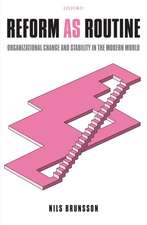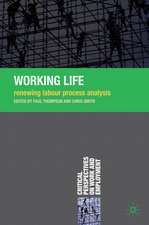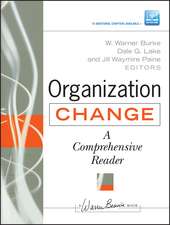The Dynamics of Change: Insights into Organisational Transition from the Natural World
Autor Francis Sticklanden Limba Engleză Paperback – 15 oct 1998
Innovative and absorbing, it charts a journey through a range of subjects including complexity science, nuclear physics, climatology, chemistry and chaos theory examining the change phenomena and the lessons it has to offer organizational and system thinkers. Key features include:
* a review of the organisational change literature
* an introduction to systems thinking
* a change framework built up from key change building blocks
* examples of change dynamics from the natural and physical sciences, and how they apply to our understanding of change within organisations
* numerous summary tables and illustrative graphics
This book, the first devoted entirely to exploring what change is as a phenomenon, has a uniquely rigorous scientific approach. It will be a valuable resource for students and professionals alike in the field of business and organizational change.
| Toate formatele și edițiile | Preț | Express |
|---|---|---|
| Paperback (1) | 535.98 lei 6-8 săpt. | |
| Taylor & Francis – 15 oct 1998 | 535.98 lei 6-8 săpt. | |
| Hardback (1) | 1015.97 lei 6-8 săpt. | |
| Taylor & Francis – 15 oct 1998 | 1015.97 lei 6-8 săpt. |
Preț: 535.98 lei
Preț vechi: 630.57 lei
-15% Nou
Puncte Express: 804
Preț estimativ în valută:
102.57€ • 106.44$ • 85.73£
102.57€ • 106.44$ • 85.73£
Carte tipărită la comandă
Livrare economică 15-29 martie
Preluare comenzi: 021 569.72.76
Specificații
ISBN-13: 9780415184168
ISBN-10: 0415184169
Pagini: 222
Ilustrații: 23 tables
Dimensiuni: 156 x 234 x 16 mm
Greutate: 0.34 kg
Ediția:1
Editura: Taylor & Francis
Colecția Routledge
Locul publicării:Oxford, United Kingdom
ISBN-10: 0415184169
Pagini: 222
Ilustrații: 23 tables
Dimensiuni: 156 x 234 x 16 mm
Greutate: 0.34 kg
Ediția:1
Editura: Taylor & Francis
Colecția Routledge
Locul publicării:Oxford, United Kingdom
Public țintă
Postgraduate, Professional, and UndergraduateCuprins
Preface List of figures Glossary of Terms Acknowledgements
Chapter 1: Managing Change - The Problem Redefined These Changing Times The Need for Something More Navigating Through the Book Summary
Chapter 2: Moving Beyond the Conventional - Systems Thinkers Unite Introduction Visionaries in Search of Inspiration Theories of Everything: General Systems The Road to Exploring Change and Transition Escaping the Familiar: The Power of the Metaphor Examples of Cross-Discipline Based Organisational Thinking Summary
Chapter 3: Organisational Change Thinking - A Look Back Introduction Change: Early Thinking Reviewed Organisation Change: Recent Developments Summary
Chapter 4: Tentative Beginnings - Some Pioneers Reviewed Introduction Theoretical Foundations What is this thing called Change - The Right Question Asked Summary
Chapter 5: Forsaking Pride and Prejudice - Multiple Perspectives on Change Introduction Reality: Real or Imagined? Knowledge: Acquired or Experienced? Change and the Outside World Problems of Definition Summary
Chapter 6: Building Blocks of Change - Part 1: The Basics Introduction Sources and Causes of Change Source Examples Types of Transition: Did he Jump, Was he Pushed or Did he Fall? The Change Focus: What Actually Changes Summary
Chapter 7: Building Blocks of Change - Part II: Embedded Dynamics Introduction Hidden Engines of Change: Embedded Dynamics Summary
Chapter 8: Building Blocks of Change - Part III: From Levels to Labelling Introduction Levels and Layers: Looking for Change Attributes of Change Degrees of Change: The Labelling Dilemma Four Change Principles: Practitioners Skip at Your Peril Summary
Chapter 9: Building Blocks of Change - Part IV: Resistance and Endings Explored Introduction Exploring Resistance to Change Outcomes and Endings Summary
Chapter 10: Making it Work and Making a Difference Introduction A Framework for Thinking A Guide for Inquiry A Question of Metaphor Defining Successful Change Suggestions for Further Research Chapter Notes Bibliography
Chapter 1: Managing Change - The Problem Redefined These Changing Times The Need for Something More Navigating Through the Book Summary
Chapter 2: Moving Beyond the Conventional - Systems Thinkers Unite Introduction Visionaries in Search of Inspiration Theories of Everything: General Systems The Road to Exploring Change and Transition Escaping the Familiar: The Power of the Metaphor Examples of Cross-Discipline Based Organisational Thinking Summary
Chapter 3: Organisational Change Thinking - A Look Back Introduction Change: Early Thinking Reviewed Organisation Change: Recent Developments Summary
Chapter 4: Tentative Beginnings - Some Pioneers Reviewed Introduction Theoretical Foundations What is this thing called Change - The Right Question Asked Summary
Chapter 5: Forsaking Pride and Prejudice - Multiple Perspectives on Change Introduction Reality: Real or Imagined? Knowledge: Acquired or Experienced? Change and the Outside World Problems of Definition Summary
Chapter 6: Building Blocks of Change - Part 1: The Basics Introduction Sources and Causes of Change Source Examples Types of Transition: Did he Jump, Was he Pushed or Did he Fall? The Change Focus: What Actually Changes Summary
Chapter 7: Building Blocks of Change - Part II: Embedded Dynamics Introduction Hidden Engines of Change: Embedded Dynamics Summary
Chapter 8: Building Blocks of Change - Part III: From Levels to Labelling Introduction Levels and Layers: Looking for Change Attributes of Change Degrees of Change: The Labelling Dilemma Four Change Principles: Practitioners Skip at Your Peril Summary
Chapter 9: Building Blocks of Change - Part IV: Resistance and Endings Explored Introduction Exploring Resistance to Change Outcomes and Endings Summary
Chapter 10: Making it Work and Making a Difference Introduction A Framework for Thinking A Guide for Inquiry A Question of Metaphor Defining Successful Change Suggestions for Further Research Chapter Notes Bibliography
Descriere
Giving a fascinating insight into the world of change and transition, this radical book, aimed at both organizational change practitioners and academics, tackles the fundamental question 'what is change?'










